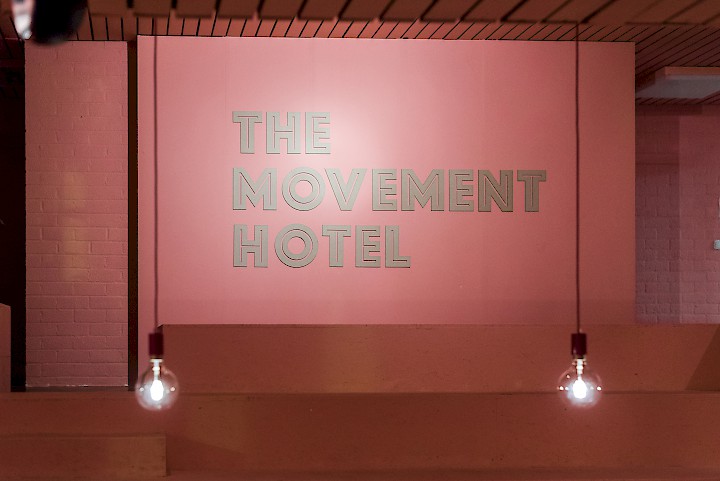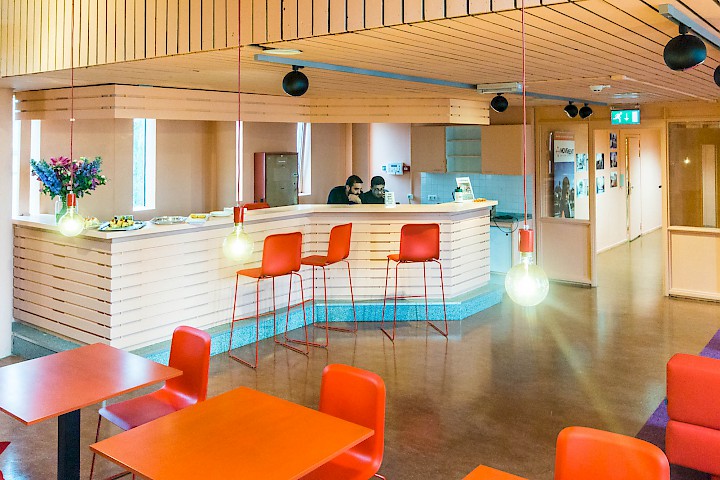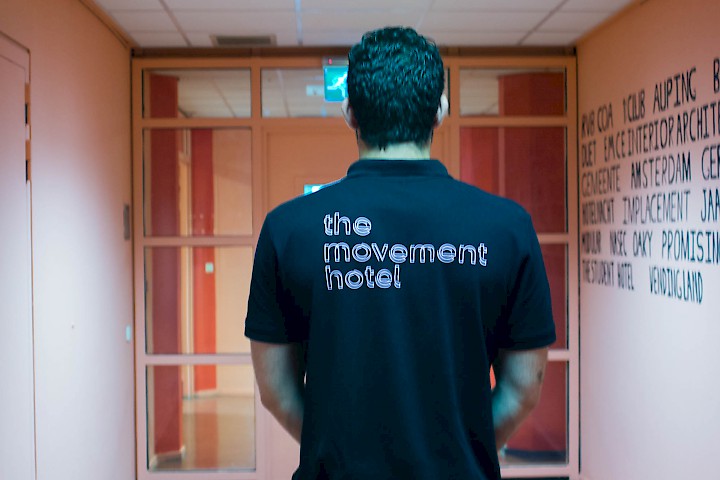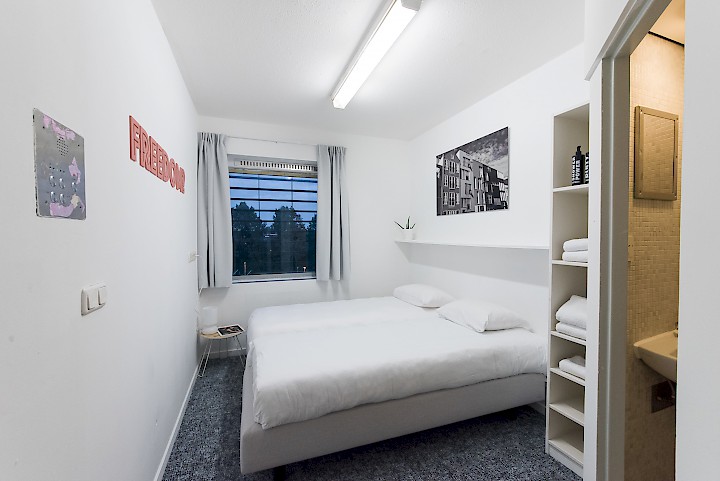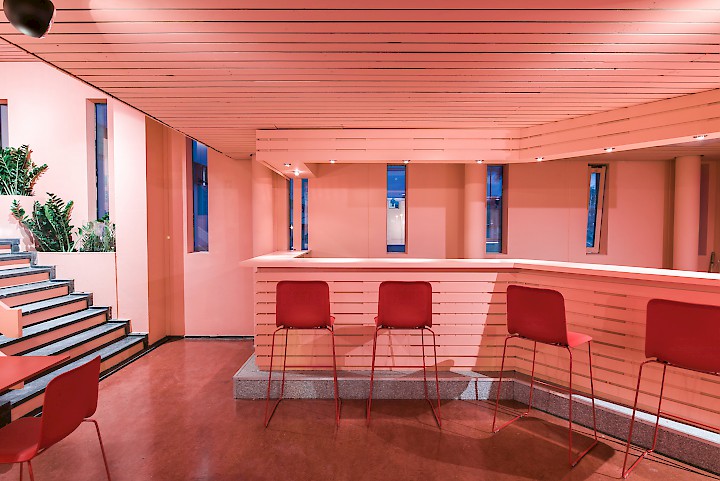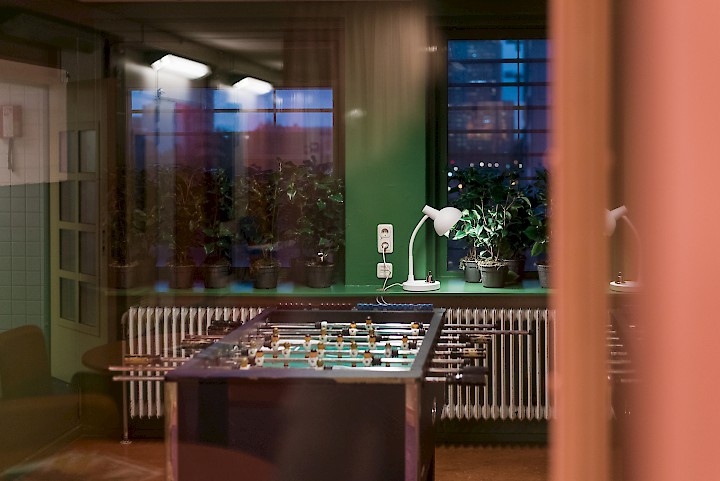the movement hotel
Deprecated: preg_split(): Passing null to parameter #3 ($limit) of type int is deprecated in /domains/lolalik.nl/DEFAULT/site/modules/TextformatterTextile/src/Parser.php on line 2227
Right from the moment you arrive at The Movement Hotel, it’s clear this not your average hotel.
After ringing the number on the door, a smiling man arrives to lead you through the labyrinthine corridors of the former Bijlmerbajes prison. As he navigates the building, Masjid explains that he is from Babylon, Iraq, and is one of the receptionists on duty. Whereas the experience at standard hotels might begin with a friendly but impersonal check-in process, The Movement Hotel is instantly about conversation, different cultures and immersing yourself in something unique. And it’s proven very popular.
“We’re actually fully booked each weekend and we’re doing quite well during the week,” explains Nina Schmitz, managing director of parent foundation Movement on the Ground, which brings together business people, creatives and companies to respond to the refugee crisis. “People are super enthusiastic.”
The 18 double bedrooms are all former prison cells – carefully redecorated, of course. But what makes this project even more special is that nearly all of the 20-strong staff are refugees, from the housekeeping to the general manager to the receptionists. Some are from the neighbouring AZC, or asylum seekers center, while others come from surrounding areas or nearby cities. This adds a whole other dimension to a guest’s stay. “First, they are mainly interested in being in a former prison,” says Schmitz. “But after a while they suddenly start to realise that it’s more than just a project in a former prison. That’s when it gets really interesting, and they start having real conversations with the people working there.
“There are no TVs in the rooms on purpose so people just end up in the reception area talking to each other.” The decision to employ mainly refugees also has another function: to better ease them into Dutch society by giving them valuable work experience and a chance to practice their language skills and build contacts. This is a common theme to all projects in cultural hub Lola Lik, where the hotel is located.
“The main purpose of this project is to try to help the new people in the Netherlands integrate quicker by providing them with a proper job in the hospitality scene,” says Schmitz. “Research shows that you integrate fastest via work: you can earn your own money, you regain your dignity, you need to speak Dutch or English, you make friends, you can support your family, you have colleagues. You’re part of society, basically.”
With this in mind, The Movement Hotel invests as much as possible in its staff, providing training, advice, job opportunities with other hotels such as the Hilton Group and a salary for those who want it. They’re also working on a training certificate system so that those who work for them will have something concrete to show future employees. “We’re trying to build a bridge between them and a real job,” says Schmitz. “Having a job makes integration work. It’s not only super important for refugees but also for people in the [host] country. Having someone like this as your colleague makes you realise what they’ve been through and that we are all just human.”
One of those employed at the hotel is Khaled al-Kordi, a 29-year-old from Damascus. He came over to the Netherlands in July 2014 after crossing over to Italy by boat from Libya and then making his way across Europe. He says he was drawn to the Netherlands because of the educational opportunities and because his father supported the Dutch national team. “He even used to have the team strip,” Kordi recalls with a laugh. “I was recently sent pictures of me as a younger child standing with my dad dressed like that.” It took six months for Kordi to get his visa sorted out, and another six months after that to get housing. During this time, he was shunted around seven different camps, most of which were in the middle of nowhere.
“There was no school, they didn’t teach us the language, the culture,” he says, with a shake of his head. “It was just food and a lot of orders. This makes it very difficult to start integrating here. Luckily I speak English, but it sucks for some people who don’t.”
The moment he moved into his new place in Rotterdam in mid-2015, he started to look for work. In Syria, he studied economics, and had previously worked for several companies doing customer service as well as cooking in a restaurant. While in the Netherlands, he held a few different jobs and even set up his own organisation to help refugees, the Syrian Cultural and Community Center. Then finally in August he heard about The Movement Hotel from a friend working with refugees in Lesbos, where Movement on the Ground has a large presence.
“I didn’t have much hospitality experience, but I’m a fast learner, so I applied anyway,” he says with a grin. After two interviews he was accepted. He asked to be a receptionist because of his previous work in customer relations and was given a week’s training in the computer system, first aid and how to use Booking.com. He took to it like a duck to water.
“My first day was on the day the hotel opened, Sept. 15, and it was really nice,” he recalls. “I don’t know if it’s because the people are great or the job is great, but I like it.” The job has given him valuable experience and an all-important referee who can vouch for him in the future, plus it’s boosting his Dutch and English skills. He has now applied for a job at the Hilton in Rotterdam, where he lives, although he admits he’s open to whatever comes along.
“I cannot say I have a plan after this job,” he explains. “I don’t know what I’m going to do. I chose this because its an opportunity for me to start something. I’ve done so many things and been through so many things, but I need to move on. This project gives refugees the strength, the opportunity, the power to continue their life,” he says, pausing before adding: “You can start again no matter what happened.”
Interested in staying over? Check the
Movement Hotel website for more information.
